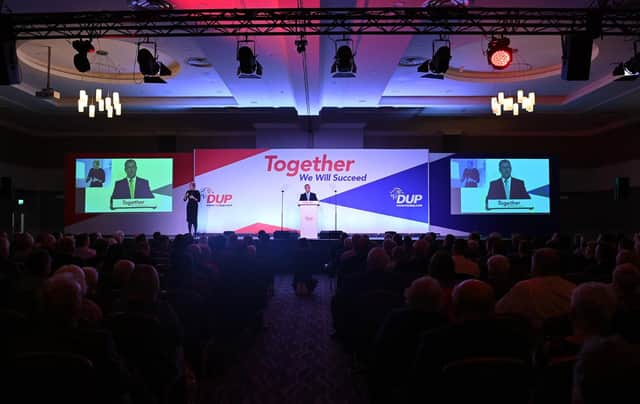Ben Lowry: It will soon become clear if the DUP split over the return to Stormont can be repaired


It will also become clear whether the divide in the party is one that can be repaired or not.
The 12 most influential people in the DUP, the party officers, met yesterday.
Advertisement
Hide AdAdvertisement
Hide AdAfter that meeting there was almost no direct indication of what had happened, as there was no indication of what had happened in the party officer meeting five weeks previously, on Friday December 15.
On both occasions, senior members of the DUP on either side of the split seem to have been unhappy about press speculation as to what the party was likely to do about returning to Stormont, and as to how officers were likely to divide on that key contentious question. I never got to the bottom of what happened in the December meeting, despite trying to speak to people on either side of the informal divide.
Similarly it is not clear what happened yesterday, although we report today that it was indeed a meeting at which Sir Jeffrey Donaldson, the leader, was hoping to reach a decision. He is confident he can get support for a return and will consult with unionist and loyalist groups this week.
Prior to yesterday the News Letter had understood that a crunch meeting was being held but the BBC Radio Ulster Nolan Show reported further claims, from a senior source who told them that the DUP meeting would discuss a return of Stormont as soon as next (ie this coming) week, that it would not just be a normal party officer meeting and that it would be a deal-or-no-deal meeting.
Advertisement
Hide AdAdvertisement
Hide AdI contributed to the Nolan Show as a guest, where I said that such a crunch moment had been a long time coming, and that it would be a moment of truth. I also said that it was wrong to say, as some people in the DUP have done, that there is merely a difference of emphasis within the party officers. There isn’t merely that, there was a very clear split.
I also reiterated my speculation, for months, that a return to Stormont will not happen without a rupture.
Do I know that for sure? Of course not. In fact I have previously been struck by how little opposition there has been within the DUP to various major moves by the party that might have attracted huge internal opposition: sharing power with Sinn Fein in 2007, the devolution of policing and justice in 2010, and the restoration of Stormont in 2020 including an Irish language act (in all but name).
Many times I have written that I felt that that latter deal involved the tearing up the three strands, when the then Northern Ireland Secretary Julian Smith allowed Simon Coveney – one of the most partisan nationalist Irish government ministers in the last 25 years – to secure jointly an agreement that delved deep into strand one (matters that pertain to the internal governance of Northern Ireland, such as nurses’ pay, and which should be the sole preserve of NI politicians). Yet this happened with no noticeable unionist opposition.
Advertisement
Hide AdAdvertisement
Hide AdIn light of that history, it is with hesitation that I write of the current split within the party, even though there is – very obviously – a big range in how enthusiastic DUP politicians are bout returning to Stormont. Indeed, Sammy Wilson MP has in comments reported on our pages openly contradicted his party leader Sir Jeffrey on matters such as whether NI can enjoy privileged access to the EU single market in a way that does not damage the UK internal market.
What is by no means clear is how this divide will be manifest in the event of a party return to Stormont amid an ongoing Irish Sea border. Will continuing opposition be kept behind closed doors? Will Sir Jeffrey be openly challenged at every stage of a return to Stormont by critics who remain within the party, as David Trimble was assailed after the 1998 Belfast Agreement (by critics including Jeffrey Donaldson indeed)?
Or will there even be people who actually depart the DUP in contempt at return amidst a continuing trade barrier in the Irish Sea?
It is my understanding that the government feels it will be able to advance on its claim on signing the Windsor Framework almost a year ago (in February 2023) that it removes “any sense of a border in the Irish Sea”. I would not be surprise it is stated that red lanes for Great Britain-Northern Ireland trade have been all but removed. We can also be sure that the government will also be legislating for Northern Ireland’s place in the UK internal market
Advertisement
Hide AdAdvertisement
Hide AdBut that is not going to be enough for the most emphatic critics, who seem to believe deeply that the DUP will be acquiescing in an internal UK barrier that could be the beginning of the end of our place in the UK.
You would expect in those circumstance there to be people who depart the party altogether, such is the scale of the schism.
Perhaps that will not happen. Most pundits think it unlikely that anyone will depart, and most people that I speak to in the DUP itself also think it unlikely.
But I still think that this row ought to be the catalyst for a realignment within unionism that is probably coming anyway. A slowly shrinking unionist voter base cannot feasibly splinter into three parties, but it might well divide naturally into two. A party that is pro Stormont, and pragmatic in its politics. And a party that feels that unionism cannot accede any further to fundamental changes to our position in the UK.
Yet, however logical such a division into two parties might be, as yet I see no sign of it.